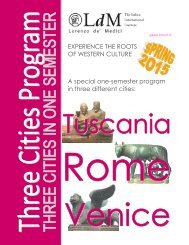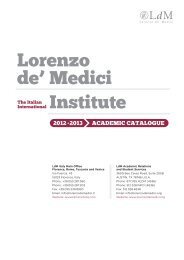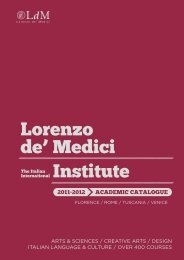aCademiC Catalog 2013-2014 - Lorenzo de Medici
aCademiC Catalog 2013-2014 - Lorenzo de Medici
aCademiC Catalog 2013-2014 - Lorenzo de Medici
You also want an ePaper? Increase the reach of your titles
YUMPU automatically turns print PDFs into web optimized ePapers that Google loves.
International Business<br />
Introduction to Business<br />
BUS 130 F<br />
Cr: 3; Contact hrs: 45<br />
This course will introduce you to the world of business and help<br />
prepare you for the economic roles of consumers, workers and<br />
citizens. This course will also serve as a background for other<br />
business courses you may take in college. Stu<strong>de</strong>nts will be<br />
introduced to each of the functional area of business, including<br />
marketing, finance, HRM, and business intelligence. The course<br />
is <strong>de</strong>signed to help stu<strong>de</strong>nts appreciate the interrelationship of<br />
these business functions and more generally, the role and the<br />
context of business in society.<br />
Introduction to Marketing<br />
BUS 150 F<br />
Cr: 3; Contact hrs: 45<br />
Marketing is a dynamic and an exciting field, a key tool in<br />
confronting the challenges that enterprises are facing every<br />
day. The purpose of this course is to introduce marketing<br />
principles and concepts. In this course stu<strong>de</strong>nts will learn about<br />
the “real” nature and scope of marketing management . They<br />
will be introduced to aspects of marketing, such as: Marketing<br />
Strategy, 4 P’s, Market Planning, Retailing and Wholesaling,<br />
Target Marketing, Market Segmentation, Services Marketing.<br />
You will also learn about the strategic importance of marketing<br />
to an enterprise, whether it be a profit oriented business firm<br />
or non-profit organization.<br />
of operating in an international market. These benefits inclu<strong>de</strong>s<br />
sourcing materials, capital, labor and expertise, relocating<br />
manufacturing, and distributing product and services to new<br />
markets. While there are many benefits, each company must<br />
i<strong>de</strong>ntify the potentially huge risks taken when operating<br />
overseas and the uninformed company may suffer tremendous<br />
set backs before realizing any benefits. This course is an<br />
introduction to the complexities and implications of foreign<br />
markets. Emphasis is on the various economic, social and<br />
cultural factors that impact on international marketing, the 4<br />
Ps (product, price, places of distribution and promotion) and<br />
how these aspects of marketing are influenced by international<br />
business environment.<br />
Prerequisites: BUS 150 Introduction to Marketing, or equivalent<br />
Event Planning<br />
BUS 232 F; Dual listed: COM 232 F<br />
Cr: 3; Contact hrs: 45<br />
This course introduces stu<strong>de</strong>nts to special event planning<br />
processes and techniques. Emphasis is on creating, organizing,<br />
i<strong>de</strong>ntifying sponsors for, marketing and implementing largescale<br />
community events, as well as show rooms and tra<strong>de</strong><br />
shows to photoshoots and fashion shows. We will explore this<br />
very <strong>de</strong>tail-oriented field as it <strong>de</strong>als with vendors, contracts,<br />
fundraising, budgeting, ethics, and other aspects. Stu<strong>de</strong>nts<br />
will research product, competition and target market to<br />
<strong>de</strong>termine best possible exposure and success. As part of the<br />
course stu<strong>de</strong>nts may organize a real event in interdisciplinary<br />
collaboration with other <strong>de</strong>partments (Graphic Design, Jewelry<br />
Design, Photography and/or Interior Design).<br />
School of Arts & Sciences FLORENCE<br />
Principles of Microeconomics<br />
BUS 178 F<br />
Cr: 3; Contact hrs: 45<br />
Economic analysis is one of the most useful tools for<br />
un<strong>de</strong>rstanding social phenomena. Principles of Microeconomics<br />
introduces stu<strong>de</strong>nts to the bases of economic ways of thinking.<br />
Economic theory is explained through the study of the<br />
methods of analysis, assumptions and theories about how firms<br />
and individuals behave and how markets work. The course is<br />
a necessary basis for stu<strong>de</strong>nts wishing to continue the study<br />
of economics and business in their aca<strong>de</strong>mic careers and is<br />
also useful for stu<strong>de</strong>nts in applied social sciences. The course<br />
is divi<strong>de</strong>d in four parts: the first is an introduction to languages,<br />
methods, and mo<strong>de</strong>ling used in microeconomics; the second<br />
part focuses on the firm production process and market<br />
strategy; the third analyses consumer theory and the way in<br />
which individual behavior is mo<strong>de</strong>led by economists; and the<br />
concluding part of the course studies how the competitive<br />
and non competitive market works. The teaching inclu<strong>de</strong>s the<br />
extensive use of case studies and policy issues which will be<br />
open to discussion with stu<strong>de</strong>nts.<br />
Principles of Macroeconomics<br />
BUS 180 F<br />
Cr: 3; Contact hrs: 45<br />
Economics is the study of choice un<strong>de</strong>r conditions of scarcity:<br />
the resources nee<strong>de</strong>d to produce goods and services are<br />
limited compared to human <strong>de</strong>sires. Economics is divi<strong>de</strong>d<br />
into two major areas. Microeconomics studies the choices of<br />
consumers, firms, and governments, and <strong>de</strong>scribes the working<br />
of markets. Macroeconomics studies the behavior of the entire<br />
economy. It explains phenomena like growth, business cycle,<br />
inflation and unemployment. This course is an introduction to<br />
economics. The basic principles of economics will be presented<br />
and applied in or<strong>de</strong>r to explain some features of the mo<strong>de</strong>rn<br />
economy.<br />
Prerequisites: BUS 178 Principles of Microeconomics, or<br />
equivalent<br />
Introduction to International Marketing<br />
BUS 220 F<br />
Cr: 3; Contact hrs: 45<br />
International competition makes international marketing<br />
one of the most critical skills for business survival. In their<br />
continuing quest for new ways to establish and maintain their<br />
competitiveness, many firms are recognizing the advantages<br />
Wine Business and Marketing<br />
BUS 252 F; Dual listed: NUH 252 F<br />
Cr: 3; Contact hrs: 45<br />
This course explores the business and marketing of wine, with<br />
special focus on U.S. markets. Wine tra<strong>de</strong> and consumption in<br />
the US have constantly increased in recent years. If until the<br />
early 1990’s wine consumption was concentrated in a few<br />
major states, today wine is consumed by a large part of the<br />
entire US population. Italian wine, counting for 30% of U.S. wine<br />
imports, is a major part of this economic and cultural scenario.<br />
In addition, new wine markets have emerged worldwi<strong>de</strong>. This<br />
growing interest has strengthened the role of traditional key<br />
players of the wine tra<strong>de</strong> such as importers, distributors,<br />
wholesalers, retailers, while helping to create new professional<br />
figures such as wine writers, wine club managers, and event<br />
promoters. In this course stu<strong>de</strong>nts learn skills that help equip<br />
them to take on such roles. Given the notable diversity and<br />
quality of Italian wines, stu<strong>de</strong>nts examine issues of sourcing,<br />
shipment chains and trading channels, and market impact. The<br />
course inclu<strong>de</strong>s business simulations, and stu<strong>de</strong>nts produce a<br />
start-up or marketing project.<br />
Prerequisites: BUS 130 Introduction to Business, or equivalent<br />
Human Resources Management<br />
BUS 260 F<br />
Cr: 3; Contact hrs: 45<br />
The course explores the Human Resource Management<br />
function in a corporate setting and focuses on the <strong>de</strong>velopment<br />
of knowledge and skills that all managers and lea<strong>de</strong>rs need.<br />
Stu<strong>de</strong>nts learn the basic principles of <strong>de</strong>signing and operating<br />
business organizations, from <strong>de</strong>veloping their mission, vision<br />
and strategy to their key organizational features and processes.<br />
Stu<strong>de</strong>nts face issues of managing people in organizations,<br />
including hierarchy, lea<strong>de</strong>rship, and communication; systems<br />
of reward and recognition; and personnel (from recruitment<br />
to training and <strong>de</strong>velopment). Some attention is given to the<br />
expanding role of corporations in <strong>de</strong>aling with social problems<br />
and issues. The course trains stu<strong>de</strong>nts to build skills relevant<br />
to lea<strong>de</strong>rship and management. These inclu<strong>de</strong> public speaking<br />
and presenting, conflict resolution, teamworking, and business<br />
project management. Class content is <strong>de</strong>livered through<br />
lectures, group discussions, practical and experiential exercises,<br />
and case studies.<br />
Integrated Marketing Communication<br />
BUS 262 F; Dual listed: COM 262 F<br />
Cr: 3; Contact hrs: 45<br />
LdM Aca<strong>de</strong>mic <strong>Catalog</strong> <strong>2013</strong>-<strong>2014</strong><br />
67





